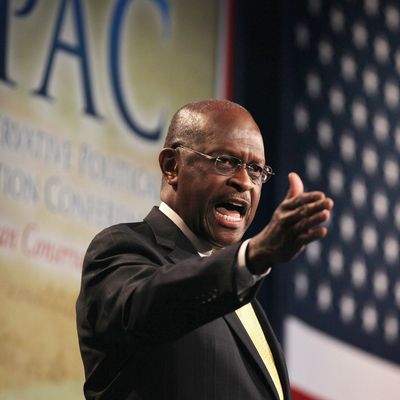
Entrepreneur, talk-radio star, and onetime presidential campaign meteor Herman Cain has died of COVID-19, which he may or may not have contracted at Donald Trump’s disastrous Tulsa rally last month. A 74-year-old cancer survivor, Cain would have been well-advised to stay far away from Tulsa, where he was seen without a mask. Then again, he had voiced opposition to mask mandates, so he was practicing what he preached.
Cain was a big fan of the president’s, before and after Trump tried unsuccessfully to appoint him to the Federal Reserve Board (Cain withdrew after Senate Republican opposition to the nomination emerged, fed by the sexual-misconduct allegations that had hounded him earlier in his career). In 2018, Cain co-founded a super-PAC to support Trump’s agenda and reelection.
In some respects, Herman Cain was a precursor to Trump. He was a successful entrepreneur who regularly toyed with politics. But unlike Trump, he began with nothing but a computer science degree, rose the corporate ladder at Coca-Cola and Pillsbury, and was eventually placed by Pillsbury at the helm of its struggling pizza subsidiary, Godfather’s. He turned that operation around, and before long was the president and then the full-time CEO of the National Restaurant Association, a perch that made him a familiar figure in conservative politics (including a star turn as an opponent of Bill Clinton’s health plan).
Cain made one pre-presidential foray in electoral politics, a 2004 Senate Republican primary race in his native Georgia, where he had moved to launch a media career. He came from nowhere to finish second to veteran congressman and state legislator Johnny Isakson. He then went to work for the Koch-funded Americans for Prosperity organization, which would turn into a major tea-party movement fountainhead after Barack Obama’s election. It was a fruitful association for Cain, who grabbed a regular radio-hosting gig at Atlanta megastation WSB, often subbing for nationally syndicated right-wing gabber Neal Boortz.
By the time Cain decided to run for president in the 2012 cycle, he had an established persona as a businessman-outsider conservative populist. As the rare Black conservative celebrity, he easily attracted attention on the campaign trail, and in a field of elected officials, became a tea-party favorite. His signature “9-9-9” tax proposal (replacing existing federal taxes with a flat 9 percent tax on income, sales, and corporate profits) was nonsense, but nicely designed for the tax-cut-mad GOP rank and file. In the fall of 2011, his stock steadily rose in the presidential contest; he began polling in the 20s, usually just behind front-runner Mitt Romney, and then occasionally showed up leading the entire field (an October Quinnipiac poll gave him 30 percent of the vote, 7 percent more than Romney).
Unlike the saturnine Trump, Cain was generally sunny and even goofy as a candidate, most famously in this moment:
In a novel attempt at lowering expectations, Republican candidate Herman Cain told an interviewer recently that he plans to simply answer “I don’t know” if he is asked “gotcha” questions by reporters covering his campaign for president. “I’m ready for the ‘gotcha’ questions and they’re already starting to come,” Cain said. “And when they ask me who is the president of Ubeki-beki-beki-beki-stan-stan, I’m going to say you know, I don’t know. Do you know?”
But unfortunately for Cain, he also differed from Trump in not being able to buy off or distract attention from women credibly alleging (though he denied it all) sexual misconduct. Late in 2011, he was hit with the double whammy of multiple sexual-harassment allegations dating from his Restaurant Association days, and a separate story involving a long-term extramarital affair. His campaign almost immediately lost altitude, and before voters began to vote, he was out of the race. It was definitely an early sign of the changing attitudes toward piggish male behavior that would lead to the Me Too movement.
After 2012, Cain took over Boortz’s radio show when the pioneer gabber retired, and remained on the periphery of conservative politics, eventually forming a friendship with the businessman-outsider “populist” pol who picked up where he had left off and added dollops of hatefulness and racism to the mix. I don’t know whether Trump studied Cain’s presidential campaign before launching his own, but Cain 2012 was indeed an experiment in unconventional right-wing politics that ended before voters could endorse or repudiate it, making it legendary.






























